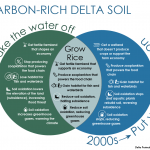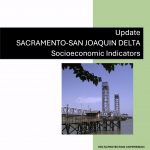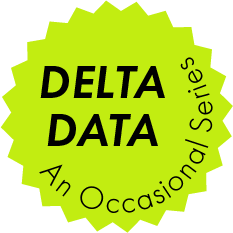Survey: The Delta Supports State-Boosted Sustainable Ag. Practice: What Does That Look Like?
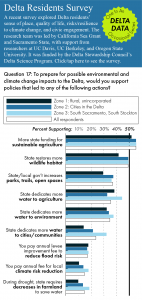
Explore more of the survey data yourself with this interactive web app.
What policies would Delta residents support for adapting to environmental changes in the region? Given nine choices in a recent survey of Delta residents, only one garnered majority support: increasing state funding for sustainable agriculture. This is one example of what that looks like.
Rice farming can be an antidote to one big Delta problem: subsidence – the sinking of heavily farmed soils well below adjacent river levels.
But while flooded rice slowly rebuilds subsided soils, it comes with its own challenge: Water on those rice fields must be kept fresh for the crop to survive. That means pumping water off the fields and into the river, then pumping fresh water back in.
The fresh water is easy to come by on Staten Island, because the 9,200-acre farm’s riparian water rights have always met its needs.
But pumping water off the island has two costs: The biggest is the power bill to pump water 30 feet up and over a levee, which is on the order of $750,000 a year for the entire island. The other cost is that it is replaced by taking more water from the river.
A solution to this problem: Recirculate the water. Recirculation keeps it fresh, gives pesticides time to break down, and reduces how much water Staten Island has to take out of the river in the first place.
Building such a system is simple, said Jerred Dixon, director of the Staten Island Preserve. What’s not so simple is the permitting process. That’s where the Fish Friendly Farming program came in.
Operated by the California Land Stewardship Institute, Fish Friendly Farming works with farmers to reduce the amount of pesticides that leave their farms and get into rivers and streams. CLSI received a grant from the Sacramento-San Joaquin Delta Conservancy to implement a Fish Friendly Farming program in the Delta, and one of the projects it completed with that grant was a recirculation system for a portion of Staten Island. (See a video about the project.)

Pumps push water up and over a 25-foot levee into the South Mokelumne River through four massive pipes.
For some farms that work with CLSI, being able to market themselves as Fish Friendly Farms is a huge selling point, particularly for vineyards that have more direct relationships with the consumers of their product, said CLSI Science Director Laurel Marcus.
But for others, what’s more important is helping them do the good things they want to do by easing the regulatory compliance burden. “The government gets what it needs, the growers get what they need, the environment gets what it needs,” she said.
That was one of the drivers for Staten Island, which is owned by The Nature Conservancy and used as a living laboratory for wildlife-friendly farming.
The other was mastering the process.
This effort was a first for CLSI and Staten Island, which means it went slowly – it took about a year and a half.
But the next effort will be easier. “The more you do things, the faster things usually go,” Dixon said. “You learn those quick routes and the shortcuts to get these things done.”
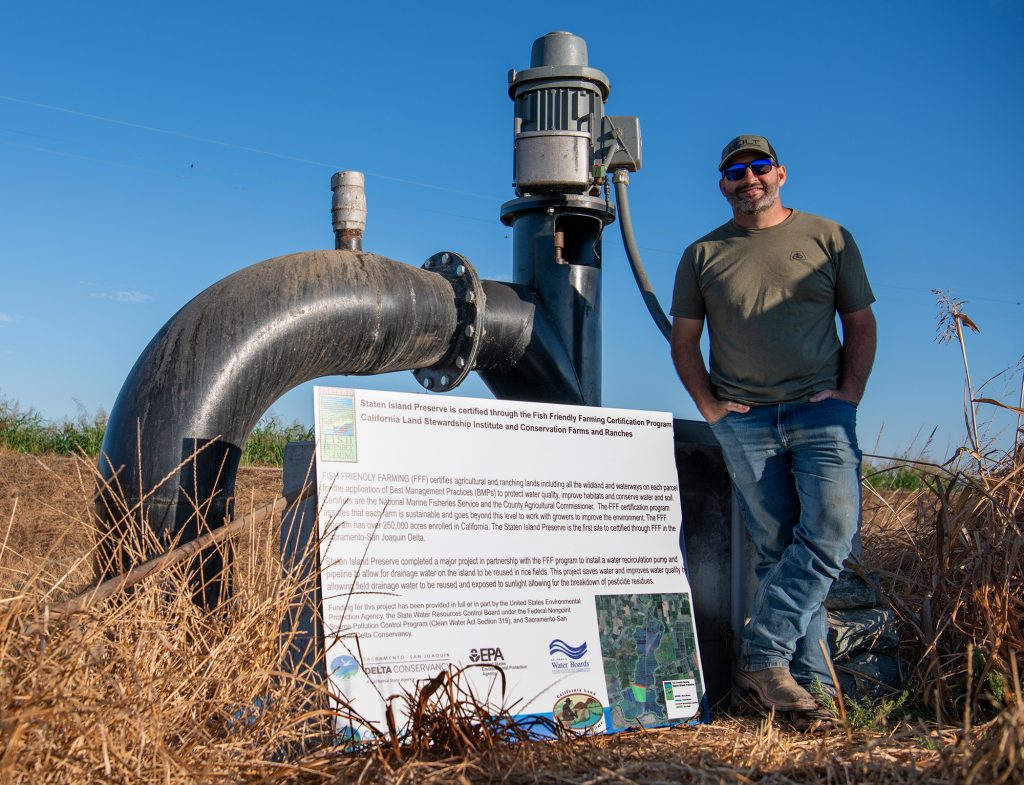
Jerred Dixon, director of the Staten Island Preserve, stands at the recirculation pump that was part of a Delta Conservancy Fish Friendly Farming grant project.
He would love to add more recirculation projects to the island. In addition to the rice land, Staten Island also has some wetlands where his goal is to use no water diverted from the river. “I could put 10 of these (recirculation pumps) on the island and make a real difference,” he said.
But he’d also love to see the practice take off throughout the Delta.
“If we can get this streamlined where we have a lot more recirculated water in the Delta, it makes water a lot more available, and it makes it more economically viable for Delta farmers as well,” he said.
“If you want to learn about it and get the lowdown, you can talk to me,” Dixon said. He can be emailed at jerred.dixon@cfrstaten.com.
“If you want to do it, call Laurel.”
The California Land Stewardship Institute is based in Napa. Science Director Laurel Marcus can be reached at (707) 253-1226 or laurelm@fishfriendlyfarming.org.
The Delta Protection Commission played an advisory role in the Delta Residents Survey. Read more about it here: Nov. 7, 2023, article in Delta Happenings
Articles Exploring Delta Data
